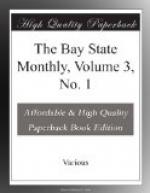The boyhood of the future journalist, correspondent and author was one of toil rather than recreation. The maxims of Benjamin Franklin in regard to idleness, thrift and prosperity were household words.
“He who would thrive must rise at five.”
In most farm-houses the fire was kindled on the old stone hearth before that hour. The cows were to be milked and driven to the pasture to crop the green grass before the sun dispatched the beaded drops of dew. They must be brought home at night.
In the planting season, corn and potatoes must be put in the hill. The youngest boy must ride the horse in furrowing, spread the new-mown grass, stow away the hay high up under the roof of the barn, gather stones in heaps after the wheat was reaped, or pick the apples in the orchard. Each member of the family must commit to memory the verses of Dr. Watts:
“Then what my hands shall find to
do
Let me with all my might pursue,
For no device nor work is found
Beneath the surface of the ground.”
The great end of life was to do something. There was a gospel of work, thrift and economy continually preached. To be idle was to serve the devil.
“The devil finds some mischief still for idle hands to do.”
Such teaching had its legitimate effect, and the subject of this sketch in common with the boys and girls of his generation made work a duty. What was accepted as duty became pleasure.
Aside from the district school he attended Boscawen Academy a few terms. The teaching could not be called first-class instruction. The instructors were students just out of college, who taught for the stipend received rather than with any high ideal of teaching as a profession. A term at Pembroke Academy in 1843 completed his acquisition of knowledge, so far as obtained in the schools.
The future journalist was an omnivorous reader. Everything was fish that came to the dragnet of this New Hampshire boy—from “Sinbad” to “Milton’s Paradise Lost,” which was read before he was eleven years old.
The household to which he belonged had ever a goodly supply of weekly papers, the New Hampshire Statesman, the Herald of Freedom, the New Hampshire Observer, all published at Concord; the first political, the second devoted to anti-slavery, the third a religious weekly. In the westerly part of the town was a circulating library of some one hundred and fifty volumes, gathered about 1816—the books were dog-eared, soiled and torn. Among them was the “History of the Expedition of Lewis and Clark up the Missouri and down the Columbia to the Pacific Ocean,” which was read and re-read by the future correspondent, till every scene and incident was impressed upon his memory as distinctly as that of the die upon the coin. Another volume was a historical novel entitled “A Peep at the Pilgrims,” which awakened a love for historical literature. Books




